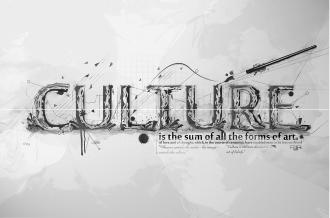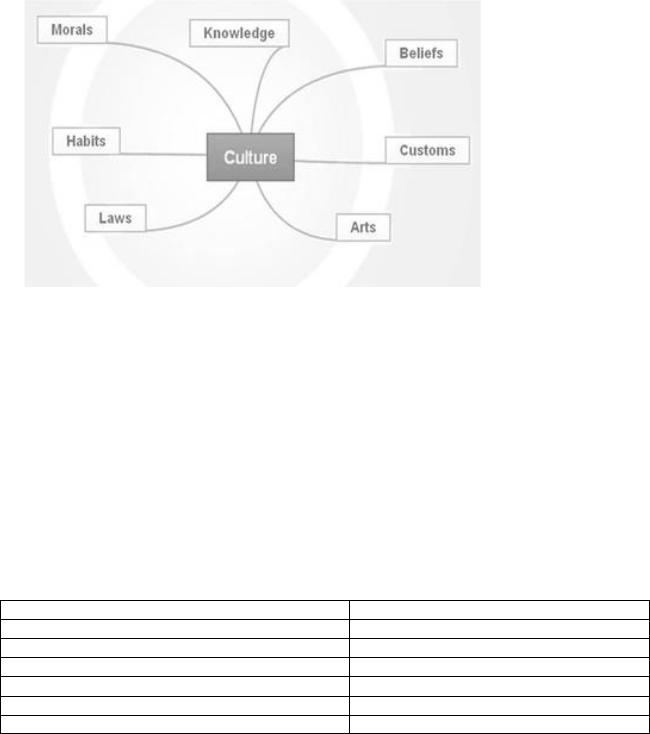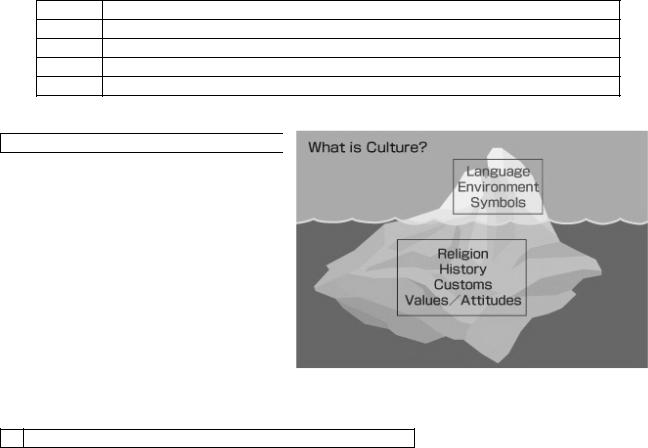
английский язык для общих целей
.pdf
Communication, society, international tourism, satellites, a broad access to, competition, labour cost, poverty, barriers, benefits.
5. Scan the text about pros, cons and effects of globalization once again. Say whether you agree with every single point or not. Use the following conversational clichés:
AGREEMENT |
PARTIAL AGREEMENT |
DISAGREEMENT |
I think it’s totally right that … |
I agree with that up to a point, |
I disagree because… |
I agree that … |
but… |
I am afraid I can’t agree with |
Yes, indeed. |
That's quite true, but… |
you. |
I think you are entirely right. |
That makes sense; however… |
The problem with that is… |
It appears to me to be true. |
It's a good idea to think that …, |
The way I see it… |
That's just what I think. |
but… |
I'm against it because… |
Exactly. I share the opinion |
|
Instead, I think that… |
that … |
|
I object to … |
|
|
I'm afraid, I don't share the opi- |
|
|
nion that … |
Practice
1. Answer the questions. Use the ideas from the previous text.
1)Has globalization affected
•your country;
•your city;
•your college life;
•your family life;
•you personally? How then?
2)Think about changes in recent years in
•education;
•job opportunities;
•culture;
•fashion;
•ideas.
3)Do you think your country needs to be protected from the effects of globalization?
4)Would you support globalists or anti-globalists? Give your reason.
Improve your study skills Developing writing strategies
Developing writing strategies
1. Study the information below.
As we live in an information society people tend to spend a lot of time on virtual communication where they express their views, opinions, and attitudes by posting them in their blogs.
A blog (also called a weblog) is a website consisting of entries (also called posts) appearing in reverse chronological order with the most recent entry appearing first (similar in format to a daily journal). Blogs typically include features such as comments and links to increase user interactivity.
As the Internet has become more social, blogs have gained in popularity. Today, there are over 100 million blogs with more entering the blogosphere everyday. Blogs have become more than online diaries. In fact, blogging has become an important part of the online and offline worlds with popular bloggers impacting the worlds of politics, business and society with their words.
The best way to post involves breaking out the main points of your message and creating a list of everything you want to include, in the order you will address it. By creating a traditional outline, it helps you work out the flow of your post and organizes thoughts in a logical manner.
2. To learn how to start a blog go to http://startbloggingonline.com/
80

3. Write a post in your blog where you reveal the necessity of international communication and argue with an anonymous anti-globalist who has made an aggressive comment about your resent message.
Project work
Make up a PowerPoint presentation about globalization in modern world. Dwell upon the following ideas:
•history
•conception
•advantages and disadvantages
•opportunities and threats.
Module 3. Life and Culture
Unit 1. Defining Culture
Lead-in.
What do you think about the importance of learning about other cultures in today’s multicultural Global Village?
What do you think Global Village is ?
What is culture? Can you give any definitions on the spot?
What is the first thing that comes to your mind when you hear the word “CULTURE”? Music? Art? Literature? Cultural patterns of behavior?
Are beliefs and values shared by people belonging to one and the same cultural community? Anything else?
What does this word mean personally to you?
Reading and vocabulary
WHAT CULTURE IS
1. The quotations reflecting different points of view on what culture is are presented in this part. While reading try to identify the key words, related to the concept “culture”, paying attention to the word combinations in bold. Compare
your list with your partners’ lists and decide what should be included into this list by all means. Ground your decision.
“What is culture? I believe, it is the way of life of a particular society or group of people, including patterns of thought, beliefs, behavior, customs, traditions, rituals, dress, language, as well as art, music and literature”. (Elizabeth Primrose)
“Culture is the collective programming of the mind which distinguishes the members of one group from another”. (Geert Hofstede)
“Very often when we use the word "culture", we mean the customs, beliefs, art, music and add the other products of human thought which were made by a particular group of people at a particular time”. (Adam Cotte)r
81
“Culture, the acquainting ourselves with the best that has been known and said in the world, and thus the history of the human spirit”. (Matthew Arnold
“Culture is the shared set of assumptions, values, and beliefs of a group of people by which they organize their common life”. (Gary Wederspahn)
“Culture is the system of information that codes the manner in which the people in an organized group, society or nation interact with their social and physical environment”. (Psychology textbook)
“Culture consists in patterned ways of thinking, freezing and reacting. The essential core of culture consists of traditional ideas and especially their attached values”. (Clyde Kluckhohnz)
“Culture consists of concepts, values, and assumptions about life that guide behavior and are widely shared by people”. (Richard Brislin)
“Culture is an integrated system of teamed behavior patterns that are characteristic of the members of any given society. Culture refers to the total, way of life for a particular group of people. It includes what a group of people thinks, says, does and makes — its customs, language, material artifacts and shared systems of attitudes and feelings”, (Robert Kohls)
“Culture refers to the experience, knowledge, values, and behaviors of any one group of people”. (Carol Archer)
“Culture is a complex concept, with many different definitions, But, simply put, "culture refers to a group or community with which we share common experiences that shape the way we understand the world. It includes groups that we are born into, such as gender, race, or national origin. It also includes groups we join or become part of. Jot example, we can acquire a new culture by moving to a new region, by a change in our economic status, or by becoming disabled. When we think of culture this broadly, we realize we all belong to many cultures at once. In a world as complex as ours, each of us is shaped by many factors, and culture is one of the powerful forces that acts on us. In other words, culture is central to what we see, how we make sense of what we see, and how we express ourselves”. (Marcelle E. DuPraw and Marya Axner)
“Culture is but the fine flowering of real education, and it is the training of the freezing, the tastes and the manners that makes it so”. (Minnie Kellogg)
“Culture is everything. Culture is the way we dress, the way we carry our heads, the way we walk, the way we tie our ties — it is not only the fact of writing books or building houses”. (Aime Cesair)
“Culture is to ''know the best that has been said and thought in the world."(Matthew Arnold)
2. Read the following interpretation of the concept “culture”. It is given in one of the Russian reference books. Compare with the definitions above. Point out differences and similarities.
Культура (от латинского слова «CULTURE» -возделывание, почитание, воспитание, образование, развитие) – исторически определённый уровень развития общества, творческих сил и способностей человека, выраженный в типах и формах организации жизни и деятельности людей, в их взаимоотношениях, а также в создаваемых ими материальных и духовных ценностях.
(Популярный энциклопедический словарь.- М.:Научн, изд-во: Большая Российская энцикло-
педия, 1999)
82

3. Explain in Russian by matching A and B parts.
|
A |
|
B |
1) |
culture |
a) |
образ жизни |
2) |
concepts |
b) |
обычаи и привычки |
3) |
values |
c) |
стиль жизни |
4) |
customs |
d) |
отношение к чему-либо |
5) |
attitudes |
e) |
манера проявления чувств |
6) |
way of life |
f) |
ритуалы и обряды |
7) |
way of thinking |
g) |
культура |
8) |
way of feeling |
h) |
концептуальные понятия |
9) |
rituals |
i) |
верования |
10) |
beliefs |
j) |
ценности |
11) lifestyle |
k) |
убеждения |
|
4. Explain in English using the words from 3.
Стиль и образ жизни, поведение, привычки, знания, продукт человеческой мысли, ценности, интегрированная система поведения, история человеческого духа, верования, чувства и отношения, материальные и духовные ценности.
5.Using on-line dictionary find out colocations with the word “CULTURE” and “CULTURAL”. Write them down Exchange with your groupmates.
E.g.: youth culture, subcultural, art culture, physical culture, sport culture, cultural aspects, crossculture etc.
6.Mark each statement as T(True) or F (or False). If false, make corrections.
T F
1)Culture is the unique and individual programming of the mind.
2)Culture is considered to be only products of human thought.
3)Culture is an integrated system of teamed behavior patterns.
4)There is no author who gave full and correct definition of the world culture.
5)Culture is a complex concept.
6)No education, no culture.
7)Culture is one of the powerful forces that acts on us.
Discussion
1.Look through the definitions of “CULTURE” again and answer the following questions:
Do all writers interpret “culture” in one and the same way? How do the different inter-
pretations differ?
Is there any person for whom culture is nothing else but art? Music? Literature?
Are there any definitions which are similar or approximately the same?
Some writers think that culture will help us survive in society? Find this definition out. Do you agree? Disagree? Justify your answer.
In which definition can you find the idea that culture is something that is shared by the members of a particular community?
83

Are there any writers who believe that culture is what is learnt and taught only in socie-
ty?
Whose definition of the concept is the most complete, from your point of view? Justify your point.
Team work.
1.Look at the diagram . Does it reflect the meaning of culture?
2.Split into groups. Make up the mind map of the concept “culture”. Explain its structure. Exchange opinions.
3.Answer the following questions:
What is the definition focused on?
Do you think that culture is a product of historical development of human society ?
Is culture a way of life? Is it a manifestation of human spirit?
4. Making predictions. What's the "cultural life" to you? Write down three predic-
tions: |
|
A. General idea |
___ ___ ____ |
B. Images |
|
C. Key words |
|
5. Some cross-cultural aspects of human life are presented in the left part of the table. Fill in the right part, adding information on the point. Discuss.
Everyday Life
Habitats and Homelands
Links with the Past
States and Systems
Education
Sports and Leisure
The Arts
84

Practice
1.Make up written translation of “culture” definition, made up by Marcelle E. DuPraw and Marya Axner.
2.Make up the most complete definition of culture from your point of view and translate it into English. Share with your group mates. Discuss and choose the best one.
Unit 2. Why is Understanding Culture so Important?
Lead-in.
How do you understand the word “international culture”? What does in mean for you?
How does it differ from the expression “national culture”?
What are the examples of your national culture? What do they include?
Try to guess what is “cultural adjustment”.
Reading and vocabulary
1.You are going to read the article from the blog Maria Abroad (http://mariaabroad.com/2010/04/what-is-culture/).
2.Some sentences are missing. Read the text and restore the missing parts.
A |
How does culture “express” itself? |
B |
Where does culture come from? |
C |
Why is understanding culture so important? |
D |
How to analyze culture? |
E |
What is culture ? |
1 
 According to Gary Wederspahn, culture is the shared set of assumptions, values, and beliefs of a group of people by which they organize their common life. In our world we can distinguish lot of cultures because of the number of countries for example, but also we can see some
According to Gary Wederspahn, culture is the shared set of assumptions, values, and beliefs of a group of people by which they organize their common life. In our world we can distinguish lot of cultures because of the number of countries for example, but also we can see some
scales in these “country cultures”.
When you travel all over the world, you have to face these different cultures with their own meaning and perception of words or gestures. Understanding cul-
ture will help you to be more aware of these differences and so avoid big mistakes in your behavior, what we call “cultural adjustment”.
2
Even if the contrary can be thought, we are not spontaneous in our behavior. Our cultures, our education, and so on, influence us in everyday situations. That is why once you know people’s values and beliefs, you can often expect and predict their behavior. We can say that our behavior is a reflection of our culture.
85

Culture is often compared to an iceberg: the visible section of the iceberg is so much shorter than the invisible part under water. Each culture has some aspects which are observable and others that can only be suspected or imagined. Thus, the part of culture which is visible, such as behavior, is only a small part of a bigger picture.
To give you a better idea of culture expression, here are listed some examples of cultural behavior: facial expressions, religious beliefs, religious rituals, importance of time, paintings, values, literature, gestures, holiday customs, nature of friendship, notions of modesty, foods and eating habits, understanding of the natural world, concept of self, work ethic, concept of beauty, music, style of dress…
3
How do people get their culture? How do they learn all the behaviors that are regarded as right and wrong in their society? This process, also known as cultural conditioning, is present in every culture, but the specific behaviors that people have, the precise content of their conditioning, is different from group to group.
Everyone knows that common culture come mainly from a common history which shapes our mind and so have influence on our behavior or way of thinking.
The most important part of your culture will be acquired during your childhood, but you will acquire new behaviors until the end of your life:
In Childhood: children learn basics activities as eating, walking, talking, dressing, bathing, etc. These basics are the origin of the future children’s behavior.
As Adults: people learn new behavior or new ways to perform thanks to education, travels, etc. Adults learn how to adapt themselves.
4
Or how to have the right behavior? We can find five steps of culture analyzing:
1)Observation/Instruction: you become aware of a particular behavior but have not yet tried to do it yourself.
2)Imitation: now you try to have the same behavior
3)Reinforcement: people help you by correcting you or showing you.
4)Internalization: you know how to behave but you still need practice.
5)Spontaneous Manifestation: you no more need to pay attention to your behavior, it comes naturally.
5 
 When you go into another country than yours, you will
When you go into another country than yours, you will
be confronted with different behaviors, different foods, and different ways of life. Most of people are amused when they see that. But most of the time they are making fun about, being narrowminded, forgetting that everybody do not have the same culture.
Understanding culture is important, as it makes you aware and more sensitive to differences, and you could avoid big mistake in your behavior or maybe adjust, but at least to respect the people that belong to other cultures than your own.
Moreover understanding culture does not only exist in the aim of helping poor little students but it is also a real challenge for international businesses. You will not promote a product in the same way in France or in Germany or in Russia.
86

Understanding culture is the most important thing when dealing and respecting people. It does not mean, you have to go out of your way to mimic a culture that is different than your own, but you should respect the other culture and treat it a different, not inferior yours! http://mariaabroad.com/2010/04/what-is-culture/
(Posted on 28. Apr, 2010 by Marie M. in Living Abroad, Study Abroad)
3.Read the text for general understanding and decide why we can distinguish a lot of cultures in the world today, how culture expresses itself. Pay attention to the words in bold.
4.Explain in Russian by matching A and B parts.
|
A |
|
B |
1) |
shared set of assumptions |
a) |
образец скромности |
2) |
meaning and perception |
b) |
образ мышления |
3) |
cultural adjustment |
c) |
восприятие себя |
4) |
reflection of the culture |
d) |
понятие красоты |
5) |
gestures |
e) |
определённый набор обязательств |
6) |
notion of modesty |
f) |
понимание и восприятие |
7) |
style of dress |
g) |
культурная адаптация, приспособляемость |
8) |
way of thinking. |
h) |
стиль в одежде |
9) |
concept of self |
i) |
жесты |
10) concept of beauty |
j) |
отражение культуры |
|
5. Scan the text. Explain in English using the words from the text.
Выражение лица, видимый, воображаемый, ограниченность(с предрассудками), высмеивать, уважительное общение с людьми, влияние поведения, знание, быть восприимчивым к культурным различиям, сталкиваться с, образ мышления, быть ограниченным, религиозные различия, природа дружеских взаимоотношений, жесты, проявления скромности, отражение культуры, культурная ассимиляция, понимание и восприятие.
6. Match the A and B columns to make collocations. Translate into Russian. Make up sentences.
|
A |
|
|
B |
|
1. be confronted with |
|
|
a)differences |
||
2. shared set of |
|
|
b) different behaviors |
||
3.to make aware and more sensitive to |
|
|
c) wright and wrong |
||
4. to influence on |
|
|
d) assumptions |
||
5.to be regarded as |
|
|
e) behavior or way of thinking. |
||
6. beliefs |
|
|
f) natural world |
||
7. nature of |
|
|
g) the end of your life |
||
8. understanding of |
|
|
h) education, travels, etc. |
||
9. acquire new behaviors |
|
|
i)friendship |
||
10. people learn new behavior or new ways |
|
h) and values |
|||
to perform thanks to |
|
|
|
||
5. |
Explain in English by matching A and B parts. Make up sentences. |
||||
|
A |
|
|
|
B |
1) |
observation/instruction |
|
a) you know how to behave but you still need prac- |
||
|
|
|
|
tice. |
|
2) |
spontaneous manifestation |
|
b) now you try to have the same behavior |
||
3) |
reinforcement |
|
c) you become aware of a particular behavior but |
||
87
|
|
have not yet tried to do it yourself. |
4) |
internalization |
d) you no more need to pay attention to your beha- |
|
|
vior, it comes naturally |
5) |
imitation |
e) people help you by correcting you or showing you |
6. Read the text once again and answer the questions.
1)What is culture according to Gary Wederspahn definition? Do you agree with it? If not say why?
2)What is “understanding foreign culture”?
3)What is being narrow-minded according to the text and what do you think of it personally?
4)Can people predict and expect their behavior?
5)Why culture is often compared to an ice-berg?
6)Give some examples of cultural behavior.
7)What are the main steps of culture analysis?
8)What makes you aware and more sensitive to differences?
9)How should the culture be treated?
Writing
Make up the summary of the text
Grammar spot
1.An adjective is a part of speech, which modifies a noun or a pronoun by describing, identifying, or quantifying words. An adjective usually precedes the noun or the pronoun which it modifies. In the following examples, the highlighted words are adjectives:
Some people can be regarded as right and wrong in different societies. Mr. Smith demonstrated rather irritating manners.
Understanding culture is also a real challenge for international businesses. The colors of the picture are dark and dank.
You become aware of a particular behavior but have not yet tried to do it yourself?
Cultural conditioning is present in every culture, but the specific behaviors that people have, the precise content of their conditioning, is different from group to group.
Some nouns, many pronouns, and many participle phrases can also act as adjectives. In the sentence “Eleanor listened to the muffled sounds of the radio hidden under her pillow, for example, both highlighted adjectives are past participles.
Grammarians also consider articles ("the," "a," "an") to be adjectives.
Adjectives can be simple, compound and derivative. Simple adjectives have no suffixes.
For ex.: small маленький, short короткий, red красный, black черный.
Derivative or compound adjectives have either suffixes or prefixes or both. The most widely spread are negative prefixes: un and in. They give an opposite meaning to the word: happyсча-
стливый, unhappyнесчастный, knownизвестный, unknown-неизвестный,legal-законный, illegal незаконный и.т.д.
Some adjectives end in –ed and have the same form as the past participle of a verb (e.g. thrilled, relieved, terrified). They are used to describe people’s feeling. The adjectives normally follow be or other verbs like feel, seem, look etc.)
She was excited going to the theatre.
The both looked astonished, when they heard the news. He seemed to be very depressed.
2.Find out different types of adjectives in the text and make up 10 sentences with them.
88

Unit 3. What is to be a Man of Culture?
Lead-in
What does it mean to you “being a cultured person?”
When and where you realized that you belong to the cultural society?
Who helped you to develop your personality culturally? Parents? Teachers? Some other people?
How often do you visit exhibitions? Go to the theatre, to the concerts? What is your favorite genre of music?
Who is your favorite writer? Do you like reading? Which books do you prefer to readelectronic or paper ones?
Do like watching films? What are your favorite ones?
Reading and understanding
1. You are going to read several texts which contain some tips how to become a person of culture. Before reading analyze what you already know (K) and what you want (W) to know on this issue. After reading decide what you learnt (L) and fill K-W-L chart.
What do I |
What do I |
What did I |
KNOW (K) |
WANT to know (W) |
LEARNT (L) |
|
|
|
|
|
|
|
|
|
|
|
|
|
|
|
2. Read the text for general understanding Find the topic sentence in each paragraph. Pay special attention to the word combinations in bold. Define the main idea. Think of the title to the text.
(A) A cultured person can be someone who is well-read in books, who has watched and engaged with classic films, has a refined appreciation for art, etc. To be cultured is also to be educated about the world and its languages, to understand world politics and be well-read in world history. Above all, a cultured person is one who is interested in culture and engages in culture.
Read more. A large part of culture comes from books, as they have existed for a longer time than most other media. The obvious thing to do would be to read classic books, but if you're a first- time-reader, this will be daunting and uninteresting.
Start backwards. Choose a genre that you have genuine interest in, such as fantasy or romantic fiction. Research the best books of that genre as judged by book enthusiasts, and read them. You may want to look up books in other genres which may catch your fancy while you're at it. If there is a genre you are not sure about, try it and you might actually enjoy it.
After you feel you've become reasonably well-read in your genre, expand your variety and also read some classic or recommended books. You will understand the books of the past more after reading books
of present culture, and you'll find you enjoy them more, too.
89
